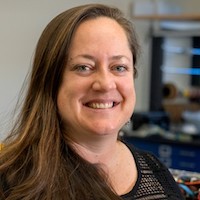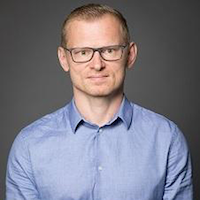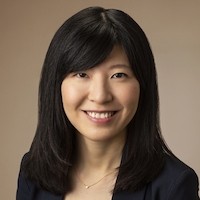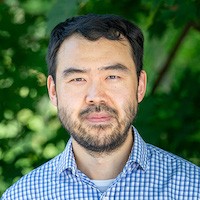News directly from Cornell's colleges and centers
X-ray probes, microfluidics, nanomaterials earn Research Excellence Awards
By Patrick Gillespie
Imaging the atomic details of materials as they function, forming microfluidic structures to study plants and animals, and new techniques for manufacturing polymer nanomaterials are among some of the research themes that helped six faculty members earn Cornell Engineering Research Excellence Awards – the highest research honor given by the Ivy League’s top-ranked engineering college.
The awards were presented at the Engineering Faculty Reception and Meeting held on Dec. 6.
Recipients of the annual awards are nominated by their departments and selected by a committee for more than just their individual research outcomes. Awardees are also recognized for their impacts on society, reputation in the field, leadership, mentorship and citizenship within the college and university.
“At the forefront of academic excellence, this year's award recipients exemplify a spirit of collaborative leadership and elevate Cornell Engineering’s standard of research,” said Lois Pollack, associate dean for research and graduate studies at Cornell Engineering. “We proudly acknowledge and celebrate their impact on our academic community and on the broader realm of science and engineering.”
The 2023 recipients are:
Matthew Paszek, associate professor, Smith School of Chemical and Biomolecular Engineering
Paszek has developed multiple protein engineering strategies in two challenging contexts: localized mechanosensors and sequence-defined glycoproteins. At Cornell, he has designed new biomaterials to tailor and probe the mechanical environment of cells. In support of these experimental approaches, he has developed powerful, predictive biophysical theories and created custom imaging approaches, including hardware and software, to visualize nano-scale dynamics in living cells. Each of these developments has been described as a technical tour-de-force of its own right. Paszek has used them to make seminal advances at the forefront of cell biology and to enable important applications in bioprocess and biomedicine.
Britney Schmidt, associate professor, Department of Earth and Atmospheric Sciences, Department of Astronomy
Schmidt carves her own path in all things, including the structure of her Cornell position. She is split between earth and atmospheric sciences in Cornell Engineering and astronomy in the College of Arts & Sciences. This split reflects her wide spectrum of research interests. On Earth, she has made a name for herself in glaciology; she has built and deployed robots (Icefin) that descend beneath the Antarctic ice sheet where it extends over the ocean – providing unique maps, images and geophysical data beneath the ice. Her longer-scale vision is to take this technology and put it on space probes to icy worlds like Europa.
Andrej Singer, assistant professor, Department of Materials Science and Engineering
Singer's research program focuses on probing the atomistic details of functional materials during their operation by developing the full capabilities of next-generation X-ray sources. Specifically, he uses in situ coherent X-ray imaging and spectroscopy to investigate the behavior of materials at the nanoscale. His research vision is to develop a mechanistic understanding of out-of-equilibrium processes will enable the rational design of materials for a wide-range of applications from energy technologies to electronic and quantum materials. These techniques are addressing materials science problems with significant societal impact ranging from energy storage and production to neuromorphic computing.
Abe Stroock, Gordon Dibble ’50 Professor of Chemical and Biomolecular Engineering, Smith School of Chemical and Biomolecular Engineering
Stroock has become an international leader in the development of micro- and nano-scale technologies for the pursuit of scientific questions and applications in biological systems. Notably, his lab led the movement of microfluidic approaches into a new area of relevance for biophysics and bioengineering with the creation of methods to form microfluidic structures in soft, organic matrices; these systems opened opportunities to study and use vascular-like function of relevance to mammalian tissue engineering and plant physiology. Building on a breakthrough enabled by his new microfluidic approaches, Stroock has focused significant attention over the past 15 years on physical studies inspired by plant physiology and on applications of physicochemical ideas and approaches to plant science and agriculture.
Rong Yang, assistant professor, Smith School of Chemical and Biomolecular Engineering
Yang’s research has had a tangible impact on the manufacturing science of soft nanomaterials by transforming chemical vapor deposition (CVD) into a versatile platform for the synthesis of a broad palette of soft polymeric materials. A first key research contribution that she made at Cornell is based on her original insight that vapor-phase solvation of monomers during CVD polymerization can enable rational tuning of a broad range of polymer film properties. And whereas prior demonstrations of CVD polymerization were limited to the synthesis of thin polymer films, she demonstrated that CVD can form the basis of approaches to shape-controlled polymer nanoparticles.
Max Zhang, Irving Porter Church Professor of Engineering, Sibley School of Mechanical and Aerospace Engineering
Zhang’s research focuses on energy and the environment, driven by societal impact. A major thrust of his research is sustainable energy systems. Working with community partners, he leads several efforts on the electrification of the heating sector, characterization of renewable resources and low-impact solar development. Zhang has also contributed to understanding the effects of airborne particulate matter and gaseous pollutants on ambient air quality, indoor environmental quality, and climate change, using numerical models and experimental techniques. His field experiments led him to create an initiative to design the first statewide public internet-of-things network in the U.S.
Patrick Gillespie is a communications specialist with Cornell Engineering.
Media Contact
Get Cornell news delivered right to your inbox.
Subscribe






